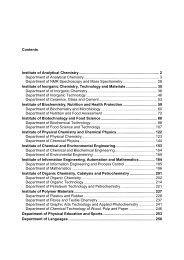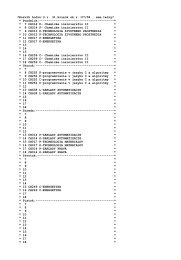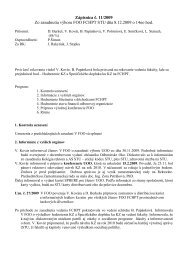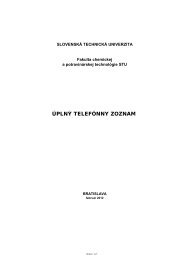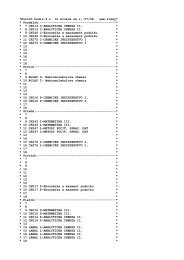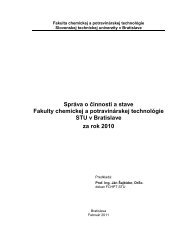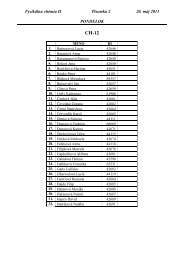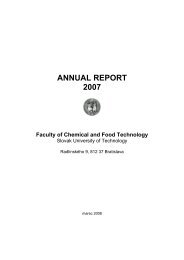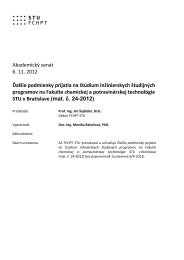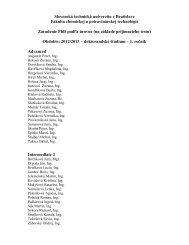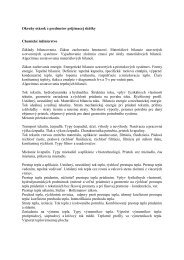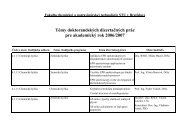rok 2006 - Fakulta chemickej a potravinárskej technológie ...
rok 2006 - Fakulta chemickej a potravinárskej technológie ...
rok 2006 - Fakulta chemickej a potravinárskej technológie ...
You also want an ePaper? Increase the reach of your titles
YUMPU automatically turns print PDFs into web optimized ePapers that Google loves.
FOREWORD<br />
The Faculty of Chemical and Food Technology (FCHPT) is one of seven faculties of the Slovak<br />
University of Technology. The history of the Faculty dates back to 1939, when Law No. 188 of 25 July 1939<br />
allowed the establishment of a Chemical Engineering branch at the Slovak University of Technology. The<br />
specialisation profile of the Faculty has developed steadily in accordance with the needs of the community.<br />
The Slovak higher education has its rich history. Our Faculty follows in the footsteps of its famous<br />
predecessor in the education of technical chemistry, i.e., the famous Mining Academy in Banská Štiavnica<br />
constituted by empress Maria Theresa in 1762. The establishment of the Dr. M. R. Štefánik College of<br />
Technology in 1937 and subsequently, that of the Slovak College of Technology in 1939 succeded in keeping the<br />
high standard of technical education in Slovakia.<br />
Within the time of its existence, the Faculty has educated more than 17 000 graduates (more than 3 700<br />
graduates in food engineering). The Faculty has trained nearly 1 300 graduates in postgraduate doctorate<br />
courses granting the title PhD in chemical and technical sciences. Thus, the Faculty has helped considerably to<br />
increase scientific knowledge in industry, education system, scientific and research institutes, and administrative<br />
services.<br />
The Faculty occupies a very specific position within the Slovak Republic and relates to the whole<br />
spectrum of chemical, food, pharmaceutical and consumer industries, and ecology. At present, some 1300<br />
students study at the Faculty and they are trained by qualified pedagogical and research staff.<br />
The Faculty currently offers study in BSc courses, MSc courses, and PhD. The undergraduate form of<br />
study is organized at two levels: Bachelor-of-Science and Master-of-Science programmes. The first level BSc<br />
course for all students lasts three years, and is run in two branches: Chemical Technology and Food Technology.<br />
This first level of the study ends by a state examination and a project granting the student the title Bachelor of<br />
Science (BSc). The nominal span of the study in the BSc course is 3 years. The second level MSc course is run<br />
in 9 majors with several possible specializations over two years. The MSc course ends by a state examination<br />
and by defending a diploma thesis. The graduate obtains the title Master of Science (MSc). In addition to the<br />
natural-science basis, students of all branches study basic engineering subjects, e.g. Chemical Engineering,<br />
Processes Control, Basics of Chemical and Food Processing Technology, as well as subjects on Economy, Law<br />
and Ecology.<br />
The highest form of university education is currently the doctorate study, which in the past was run as a<br />
form of preparation for scientific work. In 1997 the Ministry of Education of the Slovak Republic approved the right<br />
of the Faculty to train and to administer examinations in PhD Courses. The Faculty has conferred the title PhD in<br />
16 branches of the doctoral study. (Chemical Physics, Inorganic Chemistry, Organic Chemistry, Analytical<br />
Chemistry, Physical Chemistry, Macromolecular Chemistry, Biochemistry, Microbiology, Inorganic Technology<br />
and Materials, Organic Technology and Technology of Fuels, Technology of Macromolecular Materials, Chemical<br />
Engineering and Control of Processes, Chemistry and Technology of Environment, Chemistry and Food<br />
Technology, Biotechnology, Applied Informatics).<br />
The Faculty has a widely oriented programme, leading to the development of basic scientific fields in<br />
chemistry, chemical technology and food processing. This wide scientific orientation of Departments at the<br />
Faculty allows goal-oriented training of undergraduates and thereby their quicker transition to industry. There are<br />
several scientific schools at the Faculty which are successful at winning grants from domestic and international<br />
sources and at organising scientific meetings. The Faculty generally maintains an important international position.<br />
In addition to basic research, the Faculty participates in widely applied research for practice. The cooperation with<br />
many factories and companies allows for a swift application of research results in practice. At the same time the<br />
Faculty obtains considerable financial support.<br />
The Faculty participates in issuing the specialized scientific journals: Chemical Papers, Fibres and<br />
Textile, Plastics and Rubber, Journal of Radioanalytical and Nuclear Chemistry, Biology, Folia Microbiologica,<br />
Wineyard and Wine, Nutrition and Health.<br />
The scope and quality of the scientific activity keep the Faculty at a level, which is comparable with other<br />
top research and university centres in the world. This can be proved by the above mentioned number of grants,<br />
staff invitations to participate in conferences abroad, wide cooperation with foreign universities and institutions,<br />
and memberships in international organizations.<br />
March <strong>2006</strong><br />
Prof. Dušan Bakoš, PhD, DSc<br />
Dean<br />
4



